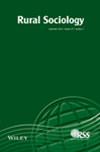照护者的幸福感是否因乡村和国家政策环境而异?确定农村、郊区和城市看护者的幸福类型
IF 1.9
3区 社会学
Q2 SOCIOLOGY
引用次数: 0
摘要
尽管护理在个人和政府花费时间和金钱的方式中占相当大的一部分,但它对护理者福祉的影响尚未得到很好的了解。在本文中,我们确定了照顾者幸福感的各种表现形式,测试了农村-郊区-城市的差异,并探讨了国家层面的家庭政策的作用。根据来自美国中北部和东北部地区的4620名成人和儿童看护人对STAT看护调查的回应,我们使用潜在阶层分析来开发看护人健康类型。我们确定了照顾者幸福感的三个潜在类别:高、中、低,并描述了每个类别的构成。接下来,我们使用多项逻辑回归来测试农村,郊区和城市护理人员在每个福利类别中的概率差异,同时考虑个人层面特征和护理基础设施的州层面背景。我们发现,与城市护理人员相比,农村和郊区护理人员在中低福利阶层中的代表性过高,而在高福利阶层中的代表性不足。此外,与国家层面的家庭政策背景相比,照顾者自身的特征在幸福感方面的差异更大。我们的研究结果说明了健全的家庭护理政策的重要性,这些政策应与农村、郊区和城市住宅的社会和建筑基础设施的差异相适应。本文章由计算机程序翻译,如有差异,请以英文原文为准。
Does Caregiver Well‐Being Differ by Rurality and State Policy Environment? Identifying a Well‐Being Typology for Rural, Suburban, and Urban Caregivers
Despite caregiving making up a considerable portion of how individuals and governments spend their time and money, its impacts on caregivers' well‐being are not well understood. In this article, we identify the various manifestations of caregiver well‐being, test rural–suburban–urban differences, and explore the role of state‐level family policy. Drawing on responses from 4620 caregivers of adults and children to the STAT Caregiving surveys from the North Central and Northeast Regions of the United States, we use latent‐class analysis to develop a caregiver well‐being typology. We identify three latent classes of caregiver well‐being: high, medium, and low, and describe the composition of each class. Next, we use multinomial logistic regression to test differences between rural, suburban, and urban caregivers in their probability of being in each well‐being class, while accounting for individual‐level characteristics and the state‐level context of care infrastructure. We find that rural and suburban caregivers are overrepresented among the low and medium well‐being classes and underrepresented among the high well‐being class relative to their urban counterparts. Additionally, caregivers' own characteristics vary more across well‐being than does the state‐level family policy context. Our findings speak to the importance of robust family care policies that are attuned to differences in social and built infrastructure across rural, suburban, and urban residence.
求助全文
通过发布文献求助,成功后即可免费获取论文全文。
去求助
来源期刊

RURAL SOCIOLOGY
SOCIOLOGY-
CiteScore
4.60
自引率
13.00%
发文量
47
期刊介绍:
A forum for cutting-edge research, Rural Sociology explores sociological and interdisciplinary approaches to emerging social issues and new approaches to recurring social issues affecting rural people and places. The journal is particularly interested in advancing sociological theory and welcomes the use of a wide range of social science methodologies. Manuscripts that use a sociological perspective to address the effects of local and global systems on rural people and places, rural community revitalization, rural demographic changes, rural poverty, natural resource allocations, the environment, food and agricultural systems, and related topics from all regions of the world are welcome. Rural Sociology also accepts papers that significantly advance the measurement of key sociological concepts or provide well-documented critical analysis of one or more theories as these measures and analyses are related to rural sociology.
 求助内容:
求助内容: 应助结果提醒方式:
应助结果提醒方式:


